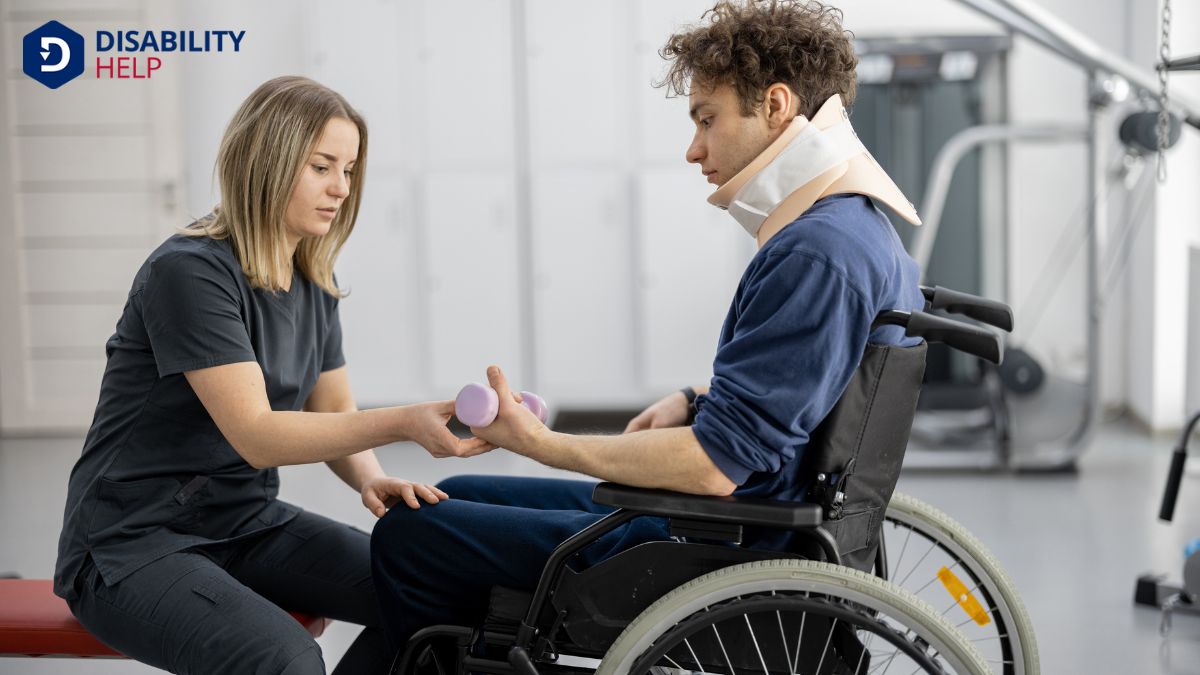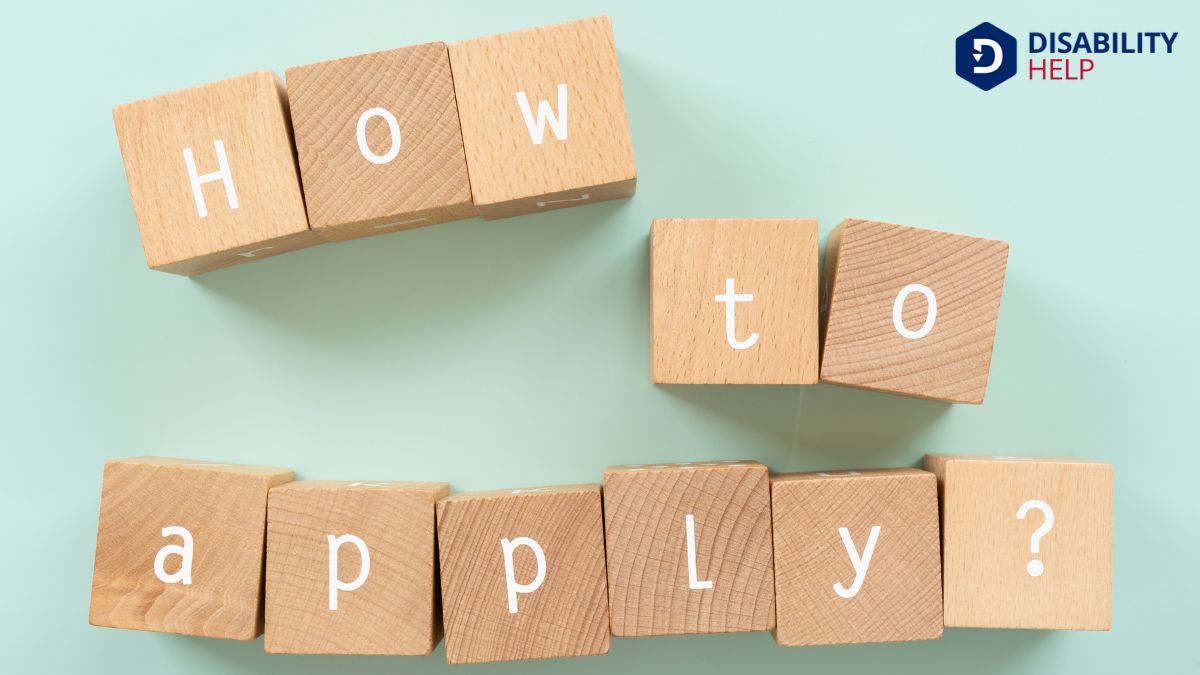We should choose Vocational RehabilitationServices that help individuals with disabilities prepare for, obtain, and maintain employment. for Disabled Vets because it offers personalized job training, education, and employment support tailored to each veteran's needs. This empowers them to develop skills and find meaningful work despite their service-connected disabilities. The program provides educational accommodationsModifications or adjustments in healthcare settings to support patients with disabilities., therapy, job-specific training, home retrofitting, and a subsistence allowance to help cover living expenses during training. Additionally, it includes employer incentives like salary subsidies and workplace modifications, ensuring veterans are well-equipped for the workforce. By exploring further, we can uncover more benefits and services that support their successful adaptation.
Key Takeaways
- Provides tailored job training and placement services to fit individual disabilities and circumstances.
- Offers personalized rehabilitationThe process of helping individuals with disabilities achieve and maintain their optimal physical, se... plans and comprehensive support to achieve employment goals.
- Supplies assistive technology and accommodations to enhance job performance.
- Monthly subsistence allowances are granted to cover living expenses during training.
- Facilitates educational opportunities and career advancement through specialized counselingProfessional guidance to help individuals cope with emotional, mental, or social challenges, particu... and resources.
Overview of Vocational Rehabilitation

Vocational Rehabilitation is a lifeline for disabled Veterans, offering essential job training, education, and employment accommodations to help them reintegrate into the workforce. This program is designed to support Veterans with service-connected disabilities by developing their skills and finding suitable employment.
Through Vocational Rehabilitation, we work closely with counselors to create individualized rehabilitation plans tailored to each Veteran's unique needs. These plans consider personal aspirations and abilities, ensuring that the path to achieving employment goals is clear and achievable.
In addition to job training, the program provides education accommodations to support Veterans in their academic pursuits, whether it's obtaining a degree or a professional certification.
One of the significant benefits is the monthly subsistence allowance, which helps cover living expenses during training. This financial support allows Veterans to focus on their rehabilitation without the added pressure of financial instability.
Vocational Rehabilitation also emphasizes independent living, ensuring that Veterans gain the skills and confidence needed to live fulfilling lives outside of their professional endeavors.
Application Process
To start the application process for Vocational Rehabilitation, we need to schedule an appointment with a Vocational Rehabilitation Counselor (VRC).
We'll also need to gather the required documentation, such as proof of our discharge status and disability rating.
Let's make sure we've our completed application and specified goals ready before the meeting.
Scheduling an Appointment
Getting started with the application process for Vocational Rehabilitation is straightforward and accessible. First, we need to contact the nearest DARS Division for Rehabilitation Services office to request an appointment. The DARS Inquiries Line can assist us in locating the closest DRS office if we're unsure where to go. When we call to schedule an appointment, it's important to let the office know if we require translator services or any accommodations to guarantee a smooth process.
Initiating the application process involves reaching out to a counselor at the DRS office. These counselors are specifically trained to help Disabled Vets navigate the various steps and requirements of Vocational Rehabilitation.
Required Documentation
Gathering the necessary documentation is an important step in the application process for Vocational Rehabilitation and Employment (VR&E) services. First, we need to complete the application form accurately. This form is our gateway to accessing VR&E benefits, so filling it out correctly is vital.
Next, we'll need proof of our discharge status. This typically involves providing a copy of our DD-214 form, which confirms that we've been discharged from military service. Additionally, we must include documentation of our service-connected disability rating. This rating, issued by the Department of Veterans Affairs, substantiates our eligibility for VR&E services.
Once our application is submitted, we'll meet with a Vocational Rehabilitation Counselor. During this meeting, we'll discuss our rehabilitation and employment plans. Together, we'll identify our employment goals or independent living goals, and determine the needed resources to achieve them.
The application process also involves evaluating our current job-seeking skills. The counselor will assist us in developing these skills and might suggest training options to enhance our employability. By assembling the right documentation and collaborating with a Vocational Rehabilitation Counselor, we can set ourselves on a path to meaningful employment or independent living.
Available Services
Now, let's explore the extensive support options available to our disabled Vets through Vocational Rehabilitation. We offer tailored employment assistance, including job placement, training, counseling, and medical aids to meet individual needs.
Our VR counselors are here to guide Veterans through various services, like home retrofitting and sign language interpreters, to enhance their employment prospects.
Comprehensive Support Options
Vocational Rehabilitation for Disabled Vets offers a wide array of services designed to support our Veterans' employment goals thoroughly. Through Vocational Rehabilitation and Employment (VR&E), Veterans can access a variety of services including job placement, training, and counseling. These services are essential for building a solid foundation for meaningful employment opportunities.
Our program recognizes that every Veteran's needs are unique, so we provide tailored services customized to individual disabilities and circumstances. This means we're not just offering generic solutions but focusing on personalized plans that maximize job success. Whether it's vocational counseling, job-specific training, or providing sign language interpreters, we guarantee each Veteran receives the support they require.
Additionally, VR&E goes beyond just employment services. We offer assistance with home retrofitting and access to advanced technologies that make it easier for Veterans to perform their jobs. Supported employmentEmployment in a competitive work environment with support services provided to individuals with disa... and therapy services are also part of our all-encompassing support, helping Veterans move smoothly into the workforce.
As a payer of last resort, VR&E ensures that Veterans utilize all available benefits from various sources first, securing the most extensive assistance possible. Our goal is to empower Veterans to achieve their fullest employment potential.
Tailored Employment Assistance
Building on the extensive support options we've discussed, let's explore the specialized employment assistance available to disabled Veterans. Vocational Rehabilitation offers tailored employment assistance designed to help Disabled Veterans find and maintain suitable jobs. Our services include training, counseling, job placement, and medical aids, all aimed at supporting Veterans in achieving their employment goals.
- Tailored Services: VR Counselors work closely with Veterans to customize services based on individual needs and abilities. This personalized approach guarantees that each Veteran receives the specific support they require.
- Comprehensive Resources: In addition to training and counseling, we offer home retrofitting, supported employment services, and other resources to facilitate successful employment outcomes.
- Specialized Assistance and Accommodations: VR&E provides specialized assistance and accommodations to ensure a smooth switch into the workforce. This includes medical aids and other necessary modifications to help Disabled Veterans perform their job duties effectively.
Examples of Provided Services
Disabled veterans can benefit greatly from the diverse range of services offered through Vocational Rehabilitation (VR)Programs that provide services to help individuals with disabilities prepare for, find, and maintain.... These programs are designed to support disabled Vets in their career pursuits by providing essential services like vocational counseling, job placement assistance, and training programs. Our goal is to guarantee that every veteran receives the personalized support needed to achieve their employment goals.
For instance, VR offers supported employment services, which provide one-on-one job coachingOn-the-job support provided to individuals with disabilities to help them learn job tasks and succee... and assistance to help veterans integrate into the workforce. We also provide therapy and even surgery when necessary to address specific physical or mental health needs that may be obstacles to employment. Assistive technology, such as specialized computer software or adaptive devices, is available to help Vets perform job tasks more effectively and comfortably.
Additionally, VR services include home retrofitting to create a more accessible living environment, which can be vital for maintaining independence and job readiness. Sign language interpreters are available to support veterans with hearing impairments, ensuring clear and effective communication during training and employment.
Our VR counselors are always on hand to guide veterans through these options, tailoring services to meet individual needs and helping them navigate their career paths with confidence.
Funding and Benefits Coordination

While the breadth of services provided through Vocational Rehabilitation is impressive, ensuring veterans can effectively access and utilize these services requires careful attention to funding and benefits coordination. By coordinating with the VA, state vocational rehabilitation programs, and other benefit sources, we can maximize available resources and facilitate employment opportunities for disabled vets.
The Department of Veterans Affairs (VA)A U.S. government agency that provides services and benefits to military veterans, including those w... plays a pivotal role in this coordination. Veterans are encouraged to use benefits like Pell Grants and the Hazelwood Act before relying on DARS (Department of Assistive and Rehabilitative Services) as the primary funding source. This approach guarantees that all applicable benefits are accessed first, optimizing financial support.
DARS serves as the payer of last resort, meaning it's essential to tap into other funding sources. Here's what we should prioritize:
- VA and State Programs: Leverage programs provided by the VA and state vocational rehabilitation programs for initial support.
- Educational Benefits: Utilize educational funding, including Pell Grants and the Hazelwood Act, to cover training and educational expenses.
- Comparable Benefits: Access similar benefits from sources like TWC (Texas Workforce Commission) and MedicareA U.S. federal health insurance program for people aged 65 and older, and for some younger people wi....
Support for Veterans
How can we guarantee veterans receive the detailed support they deserve? By leveraging VR&E services, we can secure disabled veterans have access to all-encompassing support tailored to their unique needs. Vocational rehabilitation isn't just about job placement; it's about creating a personalized rehabilitation plan that addresses each veteran's specific employment needs identified.
Whether it's returning to their former jobs with necessary accommodations or exploring new career paths, VR&E services offer a wide range of options.
We provide assistance with resume development and job-seeking skills, vital for veterans aiming to re-enter the workforce. Additionally, VR&E services extend to those interested in starting their own businesses, offering guidance and support to make their entrepreneurial dreams a reality. Through educational counseling servicesProfessional guidance to help individuals cope with emotional, mental, or social challenges., veterans can pursue further education and career advancement, ensuring they're well-prepared for the job market.
The Department of Labor employment programs for disabled veterans also play a significant role. By collaborating with these programs, VR&E services amplify their impact, ensuring that veterans receive the detailed support they need. Together, we can help veterans achieve their vocational rehabilitation goals and secure meaningful employment opportunities.
Assistance for Employers
As we explore how VR&E services support veterans, it's essential to highlight the important role employers play in this process. Employers are key to creating successful outcomes for disabled Veterans, and VR&E offers robust assistance to make this partnership beneficial for everyone involved.
To make it more appealing for employers, VR&E provides several forms of support:
- Salary subsidies: Employers hiring disabled Veterans can receive salary assistance to help offset the costs of training and accommodations. This financial aid ensures that onboarding is smooth and less burdensome.
- Workplace modifications: VR&E helps employers make necessary workplace adjustments and provides assistive technology. These changes create an accessible and productive environment for disabled Veterans to thrive.
- Non-paid work experiences: VR&E offers unpaid work opportunities, allowing disabled Veterans to demonstrate their skills and abilities. This gives employers a risk-free opportunity to assess potential employees before making a hiring decision.
Resources for Family Members
Family members of disabled Veterans play an essential role in the rehabilitation process, and they, too, have access to a wide range of supportive resources. It's clear that the challenges faced by our loved ones are also our challenges. That's why the VA offers an array of services designed to support family members in maneuvering these obstacles.
Through vocational counseling, family members can gain clarity on career paths and access job search support tailored to their needs. Education advancement services are also available, helping us find suitable schools and programs to enhance our qualifications. These resources guarantee that our professional growth isn't sidelined.
For children with disabilities of Veterans, the VA provides career goal assessments and benefits information. This guidance helps guarantee that they pursue careers aligned with their strengths and interests. Additionally, educational counseling services are offered to all family members, providing personalized advice on career developmentThe process of managing life, learning, and work over the lifespan, including for individuals with d... and academic choices.
Moreover, the VA equips us with the knowledge to effectively steer through support programs designed for our disabled Veterans. By leveraging these resources, we can better assist our loved ones while also advancing our own careers and education. Together, we can build a brighter future for our families.
How to Apply

Applying for Vocational Rehabilitation for Disabled Vets involves a few straightforward steps to secure the support you need. First, we need to make sure we meet the eligibility criteria, including having a service-connected disability and the appropriate discharge status.
Here's a quick guide to help us through the VR&E process:
- Submit the Application: Complete and submit the application form to apply for VR&E services. It's vital to have all necessary documents ready to avoid any delays.
- Meeting with a VRC: Once our application is accepted, we'll schedule a meeting with a Vocational Rehabilitation Counselor (VRC). This step is crucial as the VRC will assist in assessing our needs and determining the best path forward.
- Develop a Rehabilitation Plan: In collaboration with the VRC, we'll create a detailed rehabilitation and employment plan. This plan outlines our goals and the resources required to achieve them.
Consider seeking help from a Veteran Service Officer to make sure our application is complete and to maximize our eligible benefits. This support can make a significant difference in navigating the process. By following these steps, disabled veterans can effectively apply for VR&E and move toward meaningful employment opportunities.
Frequently Asked Questions
Why Is Vocational Rehabilitation Important to People With Special Needs?
Vocational rehabilitation is important for people with special needsA term used to describe individuals who require additional support due to physical, learning, or emo... because it gives us the skills and support to achieve meaningful employment. It enhances our independence, self-sufficiency, and quality of life, helping us overcome barriers and reach our potential.
How Does the Vr&E Help Veterans?
VR&E helps veterans by providing job training, education, and employment accommodations. We get support with resume development, job-seeking skills, and can even start businesses. Additionally, it offers independent living services and educational counseling for our needs.
What Is the Primary Goal of Vocational Rehabilitation?
Our primary goal with vocational rehabilitation is to help disabled Veterans overcome employment barriers from service-connected disabilities. We provide tools, training, and support to secure meaningful jobs, fostering career advancement and financial independence.
How Does Vocational Rehab Work in Va?
We apply for VA's Vocational Rehab, meet with counselors who assess our needs, and create personalized plans. We receive job training, education, and employment support, helping us overcome barriers and shift smoothly into civilian careers.
Conclusion
To sum up, vocational rehabilitation offers invaluable support for disabled vets. We can access a range of services, from career counselingProfessional guidance provided to individuals with disabilities to help them explore career options ... to job training, that empower us to thrive in civilian life. The application process is straightforward, and the benefits are plentiful, including financial assistance and job placement support. By opting for vocational rehabilitation, we secure a brighter future for ourselves and our families. Let's take the first step and apply today.






